|
Antal
Dorati – Recording Legend
by Tony Flynn
Background
|
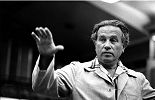 |
Like many other classical
music fans, and particularly those who
spent much of their spare cash on LPs
in the fifties and sixties, I became
familiar with the name of Antal Dorati
initially through his Mercury recording
of the 1812 Overture, famous
because it was the first to include
real church bells and cannon fire. I
subsequently went on to buy many more
LPs of the Minneapolis Symphony Orchestra
conducted by Dorati on the bargain price
Wing label, devoted mostly to mono 1950s
reissues from the Mercury back catalogue.
Cheapness was not their only advantage;
the orchestral playing on these LPs
was always alert, crisp and incisive.
My main priority at that time was to
explore new music, so the sound quality
was less important.
After the end of his
Mercury period in the mid-1960s, Dorati
continued to make recordings with different
orchestras for other labels, including
Decca, Philips, EMI, CBS, and BIS. Over
the years I continued to add recordings
made by Antal Dorati to my music collection,
partly out of loyalty to an old favourite,
but also because the recordings he made
were usually good ones. As I approach
my fifty-eighth year, spending much
spare time in reminiscence, as one does,
this seemed to me to be a suitable time
to reflect on the career of this famous
figure; as there is no shortage of biographical
information, on CD covers, in books
and on the websites listed at the end
of this article, I have concentrated
mainly on exploring Dorati’s considerable
recorded legacy.
Career
1924-1933 Various
posts in Budapest, Munster and Dresden
Opera Houses
1933-1941 Ballets
Russes de Monte Carlo
1941-1945 American
Ballet Theatre
1945-1949 Dallas
Symphony Orchestra
1949-1960 Minneapolis
Symphony Orchestra
1963-1966 BBC Symphony
Orchestra
1966-1974 Stockholm
Philharmonic Orchestra
1970-1977 National
Symphony Orchestra, Washington DC
1975-1979 Royal
Philharmonic Orchestra
1977-1984 Detroit
Symphony Orchestra
The above list may
seem an impressive enough CV for a jet-setting
20th century maestro but
it tells only a part of the story. Thumbing
through Dorati’s complete concert register
in the book, Antal Dorati and the
Joy of Making Music, painstakingly
compiled by Dorati fanatic, Richard
Chlupaty, my jaw dropped at the amazing
number of live concerts he gave, in
addition to those with those with orchestras
under his control at the time. Mercury
fans will be aware of his close association
with the LSO during the decade 1955-65.
In addition to his music directorships,
he worked with many other orchestras:
the Philharmonia, LPO, Israel Philharmonic,
Basle Chamber Orchestra, Bamberg Symphony,
Concertgebouw and of course, had a long
association with the Philharmonia Hungarica.
Once Dorati moved to
the USA in 1941 all the above posts
were of principal or chief conductor.
In the majority of cases his task was
to revitalise or even rebuild the orchestra
- in the case of Dallas, from scratch.
Dorati took his work seriously and only
moved on after he felt he had accomplished
the task set him at the start of his
tenure. His arrival in a new post signalled
a period of significant change, although
this did not necessarily involve an
increased turnover of personnel. Typical
features of a Dorati regime were: a
rapid improvement in orchestral playing
standards, more contemporary repertoire,
international tours and new recording
contracts.
Perhaps his most successful
achievements were in Dallas, Minneapolis,
Stockholm and Washington. On his arrival
in Dallas he found that there was no
orchestra! During his time in Minneapolis
he achieved international fame. The
quality and profile of the Stockholm
orchestra were raised to new heights,
with international tours and new repertoire.
In Washington the orchestra underwent
a significant expansion and the standard
was raised from a third rate band to
an ensemble of a quality more in keeping
with a capital city.
The
recordings
Dorati’s prolific recording
career stretched from 1934-1988. His
legacy of over 600 recordings shows
a very wide range, but with a high proportion
of 20th century music. Most
listeners readily associate him with
Haydn, Bartók and Stravinsky,
less so with mainstream works by Mozart,
Beethoven, Schubert, Schumann, Brahms,
Bruckner or Mahler. Apart from being
a renowned champion of contemporary
music Dorati had a flair for making
unusual, often original, recordings
of certain works by better known composers:
the famous 1812 with cannons, the 3
great Tchaikowsky ballets (complete),
Tchaikowsky’s Suites, the complete Haydn
Symphonies and eight of Haydn’s operas.
Selecting the best from such a huge
list has been a daunting task. I am
all too aware of the subjective aspect
of this task. It is very doubtful whether
there is another person who would make
the same choice of recordings as I have
done. Finally I do not claim to have
heard every one of the 600 plus recordings,
although I have done my best to listen
to many of them, often several times.
Early Recordings
Although Dorati could
not be described as prolific during
his pre-Mercury period, he made a number
of recordings, some of which have made
it onto CD. Perhaps the most significant
from this period are: his 1937 Sheherezade
with the LPO, restored by Dutton,
which I would like to hear; a 1946 Bartók
Violin Concerto 2 with Dallas SO/Menuhin;
a renowned 1949 Prokofiev Piano Concerto
3 with Dallas SO/William Kapell.
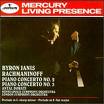 Mercury
Period
Mercury
Period
During my youthful
acquaintance with the Wing label I became
familiar with many of Dorati’s mono
recordings from the early fifties, of
which only one has surfaced in CD format,
the complete Swan Lake ballet.
Of these mono Minneapolis recordings,
apart from the complete Tchaikowsky
ballets, I recall a fine Tchaikowsky
5 and an involving Berlioz Symphonie
Fantastique. While it is unlikely
that any of these early mono recordings
will appear on commercially produced
CDs, I note that some independent companies
have recently made available many items
from the early Mercury catalogue in
LP to CD transfers. Examples include
the Tchaikowsky Symphony 5 and the Nutcracker
and Sleeping Beauty Ballets with the
Minneapolis SO.
I know that for many
fans, including Richard Chlupaty, the
author of a recent book on this conductor,
these Mercury recordings remain supreme,
where Dorati’s vigorous and direct performances
are matched by bright clear Living
Presence recorded sound. Having
recently devoted much time to revisiting
many of these Mercury recordings, I
have to confess to experiencing more
than a little disappointment to discover
that many old favourites, and in particular,
those involving the Minneapolis Symphony
Orchestra, had not worn well. The acoustic
of the hall used for the sessions in
Minneapolis often produced a dry, boxed-in
sound, with thin strings and reedy woodwind,
starving the music making of richness
and making for uncomfortable listening.
During the latter part of Dorati’s Mercury
period (1955-1965) most of his recordings
were made with the LSO, in Watford and
Wembley Town Halls, with far better
recorded sound. One disc which illustrates
the different sound qualities is the
Rachmaninoff Second and Third Piano
Concertos with Byron Janis. The Second,
recorded in Minneapolis in 1960, really
sounds its age, while the Third, recorded
in London only a year later, sounds
much richer.
Let me emphasise that,
in compiling my list, I have not judged
solely on recording quality, far from
it. Dorati was a conductor who seems,
more than other conductors, to polarize
opinion on his merits. It is evident
from the considerable praise heaped
on his recordings that some regard him
as a god while others see him as a time-beating
automaton who ruled orchestras by fear
and ill-tempered outbursts. Revisiting
these later Dorati LSO Mercury recordings
made me aware of their strengths and
weaknesses. Clearly the LSO under Dorati
was galvanised to play to a very high
standard, giving performances with huge
rhythmic drive and energy. This made
a huge impact in colourful scores such
as Copland’s ballets, Prokofiev’s Scythian
Suite as well as works by: Enesco, Stravinsky,
Rimsky Korsakov, Respighi and Bartók.
There is not enough space to mention
every disc, but two personal favourites
are: firstly the complete Liszt Hungarian
Rhapsodies and the 2 Enesco Rumanian
Rhapsodies, in readings which succeed
marvellously in capturing the spirit
of a gypsy band. The other sparkling
disc is of pieces by Rimsky Korsakov,
including the Golden Cockerel suite
and Capriccio Espagnol.
However there can be
a fine line between exciting, sometimes
electric, playing and times when even
the best orchestras can sound seriously
hard-pressed. My recent listening sessions
made me realise that this particular
line was crossed on many occasions.
Pressing an orchestra too far produces
a feeling of surface brilliance, resulting
in music making which sounds aggressive,
cold and mechanical. Examples of recordings
which suffer badly from this fault in
my view include: Mendelssohn Symphony
3, Tchaikowsky Symphony 1, Brahms Symphony
1, and a surprisingly charmless and
unyielding reading of Brahms’ Hungarian
Dances. In fact I am unconvinced
by any of Dorati’s Mercury Brahms recordings;
these include the Symphonies, the Violin
Concerto and a rather cool St Anthony
Variations.
Further, I do not share the enthusiasm
others have expressed for the 1959 LSO
coupling of Dvořák Symphonies 7
& 8, the performance of the latter
which I find especially driven and heartless,
the first and last movements
being terminated in a brusque manner,
sounding to me like a door being slammed
firmly shut! When hearing these recordings,
all too often one is reminded of former
LSO member Neville Marriner’s description
of Dorati’s conducting "somebody
fighting to get out of a sack".
Music frequently needs to be gently
caressed rather than beaten into shape.
I detect a steely edge
to recordings of overtures by Weber
(Concertgebouw), Verdi and Wagner (LSO).
A critic in the Penguin Guide referred
to an "absence of incandescence"
in the Mercury LSO Wagner disc; the
same tag could also apply to Dorati’s
later 1974 NSO disc of orchestral highlights
from Wagner’s Ring, despite being
warmly recorded by Decca. This lack
of inner glow explains why his readings
of tone poems by Richard Strauss are
underwhelming, in spite of excellent
orchestral playing from the Minneapolis
SO on Mercury and later, with the Detroit
SO, superbly recorded on Decca. This
absence of warmth proves especially
damaging in the complete set of Tchaikowsky
Symphonies with the LSO, which, for
me, is the most disappointing set of
recordings he made in his career.
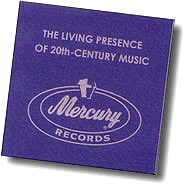 Another
reservation about these performances
stems from when the beat is over emphatic,
often heavy, to the point of rhythmic
rigidity, a criticism which was levelled
at Dorati throughout his entire career.
A respected critic in a BBC Record Review
described his conducting of Ma Vlast
in his later Amsterdam recording
of the work as "metronomic".
In his frank and entertaining autobiography,
"Notes of Seven Decades",
Dorati showed his awareness of this
issue, acknowledging that early in his
career he had been inspired by Toscanini,
and his meticulous attention to the
score:
Another
reservation about these performances
stems from when the beat is over emphatic,
often heavy, to the point of rhythmic
rigidity, a criticism which was levelled
at Dorati throughout his entire career.
A respected critic in a BBC Record Review
described his conducting of Ma Vlast
in his later Amsterdam recording
of the work as "metronomic".
In his frank and entertaining autobiography,
"Notes of Seven Decades",
Dorati showed his awareness of this
issue, acknowledging that early in his
career he had been inspired by Toscanini,
and his meticulous attention to the
score:
"This kind
of music-making I had never heard before.
I became completely devoted to it and
learned only later that it did not suit
my own temperament and led me towards
rigidity."
There are many other
conductors who adopted Toscanini’s creed:
literal adherence to the score, minimal
rubato and tight, disciplined orchestral
playing, some even copying the Maestro’s
irascible behaviour! In Dorati’s much
admired recording of Dvořák’s Seventh
Symphony (with the LSO and coupled with
Symphony 8) some of the more lyrical
moments are spoiled by rhythmic monotony:
listen to the second
subject of the opening movement or the
trio section of the third movement,
both sounding strangely lifeless and
inert. After recently listening to this
performance I turned to a recording
of the Dvořák 7 made by Monteux,
also with the LSO, at about the
same time. It is an equally dramatic
reading, but never sounds forced, so
that the pacing seems more natural.
Another almost grotesque example of
rhythmic stiffness is the opening of
Tchaikowsky’s Serenade for Strings (with
the Philharmonia Hungarica), which ruins
the performance for me. Some readers
may at this point feel that I have set
out to rubbish the acclaimed Mercury
label and the reputation of their star
conductor. This is far from the case.
Dorati made many fine recordings for
this label, but in my view, his best
was still to come.
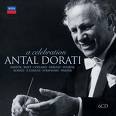 Post
Mercury Period
Post
Mercury Period
If you listen to recordings
made from roughly 1966 onwards, around
the time Dorati arrived in Stockholm,
you hear a far more mellow, relaxed
man. The typical Dorati hallmarks -
discipline, clarity and finely tuned
orchestral balance, matched by vigour
– are still there. What has gone is
the edgy, driven, almost manic, quality
of many of his earlier recordings.
Dorati explored the
issue of maturity in some depth in his
autobiography:
"If I now show
any signs of so-called maturity, it
certainly did not emerge any sooner
than my sixties".
Reflecting on his early
conducting experiences in his later
years Dorati must have regretted that
while he took great professional pride
in his conducting career, he had behaved
so unprofessionally on occasions, throwing
tantrums during some rehearsals. Such
behaviour cannot have endeared him to
musicians nor fostered a congenial atmosphere
for music-making.
I think Dorati was
absolutely correct in his self-assessment
of delayed maturity and his recorded
output provides clear evidence to support
this view. I can offer several examples
to demonstrate the point. At the start
of this period his finely judged 1966
set of Tchaikowsky Suites offers a much
more satisfying musical experience than
the strangely unappealing cycle of Tchaikowsky
Symphonies made only a few years earlier
with the LSO. In all four Suites the
speeds are well judged, but the pace
is never forced. The set crackles with
energy but glows with an abundance of
warmth and charm, qualities notably
absent in the Symphonies set, where
the opening movement of the First Symphony
sets the tone, sounding brusque, fierce
and devoid of warmth and charm. Similarly
the splendid 1975 recording of the Nutcracker
ballet with the Concertgebouw Orchestra
is much more satisfying than the 1962
version with the LSO, where high levels
of tension in the playing deprive the
undeniably brilliant performance of
warmth.
Mention must be made
of the finely judged set of Tchaikowsky
tone poems, made in Washington, which
reveal a keen sense of climax and orchestral
balance and demonstrate the improvements
in orchestral standards which Dorati
had brought to the capital city in a
relatively short time.
Dorati
was a fine Dvořák conductor but
his Mercury recordings of this composer
do not show him at his best. The wonderful
and original Decca Phase 4 NPO Dvořák
New World (1966), certainly
not lacking in drama, is far superior
to the harder edged Concertgebouw version
of 1959. Also his later recordings of
the American Suite, Czech
Suite and
other short pieces by Dvořák perfectly
combine sensitivity, freshness and energy.
A personal favourite
recording of mine from this new mature
Dorati period is his Sibelius Symphony
2 with the Stockholm Philharmonic, his
only recording of a Sibelius symphony.
It has a sweep and a keen sense of drama,
with finely judged climaxes. The finale
is brisk but never sounds hard pressed.
Listening to this disc and Dorati’s
fine 1969 LSO EMI disc of Sibelius tone
poems, one can only wish that he had
made more recordings of this cool and
clear sighted composer, with whose temperament
he was evidently much in sympathy. While
in Sweden Dorati made a number of impressive
recordings of Scandinavian works by
Rosenberg, Blomdahl, Berwald and Pettersson.
His well judged advocacy of Pettersson’s
highly original Seventh Symphony resulted
in a classic recording, with the Stockholm
orchestra sounding superb in a harrowing
and challenging score. With the same
orchestra Dorati also made his only
commercial Mahler recording, of the
Fifth Symphony. It too is very well
played and recorded, but the interpretation
is much too literal. In this and in
his radio broadcasts of other Mahler
Symphonies, Dorati appears to be completely
out of sympathy with Mahler’s temperament
and the results, for me at least, are
bloodless, however committed the playing.
For the remaining twenty
years of his post-Mercury career Dorati
continued to record successfully a mix
of established repertoire and frequently
unusual, often new pieces, such as works
by Pettersson, Messiaen, Dallapiccola
and Gerhard. The Kodaly set of complete
orchestral music has a special magic,
with a Hungarian orchestra playing with
great commitment and passion, despite
rather undernourished strings. Dorati
conducted Bartók during all periods
of his career and all his Bartók
discs are worth hearing, including his
many collaborations with Yehudi Menuhin
in the Concertos, a fine meeting of
minds. Eyebrows may be raised at my
inclusion of the 1983 Concertgebouw
Concerto for Orchestra, which
some feel lacks the elemental thrust
of the famous LSO version of 20 years
earlier. It is very different, more
elegiac, but offers an alternative perspective
which is just as valid. I make no apology
for including both versions in my final
list. Pride of place on my chosen list
goes to his pioneering set of the complete
Haydn Symphonies, not forgetting that
he also made excellent discs of many
Haydn operas and the complete oratorios.
If there is one serious
disappointment from this period, it
has to be the 1975 RPO set of complete
Beethoven Symphonies. It was generally
dismissed at the time, criticised for
lack of vigour (exceptional for this
conductor!) and it is doubtful whether
or not it will ever reappear, even on
a budget label. Performances are surprisingly
routine, perhaps due to lack of adequate
rehearsal time. Pick of the set is probably
the Fifth, which seemed to suit Dorati’s
temperament, while the Pastoral receives
a dull reading every bit as unsympathetic
as his earlier 1962 LSO recording. I
know that there are some who regard
Dorati as a fine Beethoven interpreter,
pointing to his LSO recordings of the
Fifth (1962) and Seventh (1963). On
the evidence of his recorded legacy
I remain unconvinced, citing the lacklustre
RPO set and the somewhat unyielding
Minneapolis mono versions of Symphonies
3, 4, 5 and 8. The Penguin Guide at
the time used "brisk and efficient"
to sum up the Fifth; I would concur.
The best Dorati
recordings
|
1956/9
|
Rimsky-Korsakov
Capriccio Espagnol, Golden
Cockerel suite etc
|
LSO
|
|
1957
|
Prokofiev Scythian
Suite
|
LSO
|
|
1958
|
Tchaikowsky Overture
1812
|
MinSO
|
|
1959
|
Stravinsky Firebird
Ballet
|
LSO
|
|
1960-3
|
Liszt Hungarian
Rhapsodies 1-6/Enesco Rumanian
Rhapsodies 1-2
|
LSO
|
|
1962
|
Bartók
Concerto for Orchestra
|
LSO
|
|
1962
|
Vienna (1908-1914)
Music by Schoenberg, Berg and
Webern
|
LSO
|
|
1964
|
Bartók
The Wooden Prince Ballet
|
LSO
|
|
1964
|
Bartók
The Miraculous Mandarin Ballet
& Divertimento
|
BBCSO
|
|
1964
|
Gerhard Symphony
1 & Don Quixote Ballet
Suite
|
BBCSO
|
|
1966
|
Tchaikowsky Suites
for Orchestra (complete)
|
NPO
|
|
1965-6
|
Bartók
Violin Concerti & Viola Concerto
|
NPO
|
|
1966
|
Dvořák
Symphony 9
|
NPO
|
|
1967
|
Sibelius Symphony
2 & Berwald Symphony 2
|
SPO
|
|
1969
|
Pettersson Symphony
7
|
SPO
|
|
1970-2
|
Haydn Symphonies
(complete)
|
PHIL HUNG
|
|
1972
|
Messiaen La
Transfiguration de Notre Seigneur
Jésus Christ
|
NSO
|
|
1973
|
Kodaly Orchestral
Music (complete)
|
PHIL HUNG
|
|
1974
|
Gerhard The
Plague
|
NSO
|
|
1974
|
Dallapiccola
Il Prigionero
|
NSO
|
|
1973-4
|
Tchaikowsky Tone
Poems
|
NSO
|
|
1975
|
Tchaikowsky The
Nutcracker (complete)
|
ACO
|
|
1976-9
|
Haydn Oratorios:
The Creation, The Seasons,
The Return of Tobias
|
RPO
|
|
1975-80
|
Haydn 8 Operas
|
LAUS CO
|
|
1980
|
Szymanowski Symphonies
2 and 3
|
DSO
|
|
1980
|
Dvořák
Czech Suite &
other pieces
|
DSO
|
|
1981-4
|
Copland Rodeo,
El Salon Mexico & other
pieces
|
DSO
|
|
1981
|
Stravinsky Rite
of Spring
|
DSO
|
|
1983
|
Dvořák
American Suite,
Slavonic Dances (complete)
|
RPO
|
|
1983
|
Bartók
Concerto for Orchestra
|
ACO
|
ACO Concertgebouw
Orchestra
BBCSO BBC Symphony
Orchestra
DSO Detroit Symphony Orchestra
LAUS CO Lausanne Chamber Orchestra
LSO London Symphony Orchestra
MinSO Minneapolis Symphony Orchestra
NPO New Philharmonia Orchestra
NSO National Symphony Orchestra,
Washington DC
PHIL HUNG Philharmonia
Hungarica
RPO Royal
Philharmonic Orchestra
SPO Stockholm
Philharmonic Orchestra
Dorati as composer
In this short article
I have not attempted a full appraisal
of Dorati’s achievement as a composer
for two reasons. One reason is lack
of space, the other more importantly
a lack of in-depth knowledge of his
compositions, many of which are not
available as recordings and which I
have yet to hear. What is apparent to
me however is that the more I listen
to his music, I become more impressed
by it. Dorati wrote music which is much
more than just technically capable.
Often betraying his Hungarian roots,
he owes a clear debt to Bartók
and Kodaly but his music bears the stamp
of originality. The music reveals as
you might expect, a full command of
scoring, including competent use of
a large orchestra. Dorati demonstrated
mastery also of a wide range of musical
media, including symphonies, concerti,
chamber and chorus. He seems particularly
adept when writing for wind instruments:
Trittico, written for three different
wind instruments and orchestra (or twelve
solo strings or piano); Duo Concertante
for oboe and piano; Notturno
and Capriccio for oboe and
string quartet; Night Music for
two flutes and Divertimento,
another Oboe Concerto from 1976. All
of these fine pieces show equal amounts
of depth of feeling, virtuosity, colour
and a vivid sense of humour. For fuller
information on this aspect of Dorati’s
career see the two Dorati websites and
the article by Calum MacDonald listed
at the end of this article, part of
which is included in Richard Chlupaty’s
book.
Summary
One point which struck
me while researching this piece was
the extraordinary energy of this man.
He crammed so much into his life: two
marriages, fatherhood, a huge recorded
legacy and thousands of concert and
theatre performances of orchestral music,
including ballet and opera, across all
the continents. Dorati the composer
produced a sizeable volume of music,
both original compositions and arrangements
of music by other composers. On top
of all this, he still found time to
sketch, paint and to write a very full
and entertaining autobiography; this
book was completed during the 1970s,
an astonishingly productive period for
Dorati in the concert hall and recording
studio during which time he led three
orchestras in Stockholm, London and
Washington DC. Maybe he wrote it to
stave off boredom during flights! He
was almost certainly the only international
conductor who could have completed the
Decca Haydn Symphonies project in such
an amazingly short schedule, with no
compromise in standards.
Twenty years have passed
since Dorati’s death and his name continues
to feature prominently in musical circles.
His recordings have been reissued countless
times, some of his own music remains
available in score and on CD and, in
recent years, we have seen the appearance
of two new websites and two books which
include a discography and a comprehensive
concert register. Few other conductors
of comparable stature have attracted
this degree of interest. I cannot say
how future posterity will treat other
big name conductors – Reiner, Ormandy,
Stokowski, Szell, Karajan, Solti, Leinsdorf
- who led the top orchestras during
the recording boom in the post-war period.
It may be that the vast majority of
reissued recordings of these titans
have been bought repeatedly by the same
music lovers who, like myself, first
heard LP versions of their heroes in
their youth way back in the ’50s and
’60s and continue to feast on a diet
of nostalgia. What will happen when
we all die off? Will future music purchasers
find the same magic in those aging recordings?
I personally doubt it but, all the same,
I would be pleasantly surprised I was
proved wrong and that in the year 2050
sales of Mercury Living Presence or
RCA Living Stereo recordings in some
future mind-boggling technological format
remained buoyant.
Antal Dorati was undoubtedly
one of the great names on the international
classical music scene during the 20th
century. He was a hugely gifted and
cultured man with a broad range of talents.
As a conductor he achieved international
stature, despite significant flaws in
both temperament and technique. While
there can be little doubt that in his
maturity he succeeded in overcoming
his temperamental flaws, his detractors
will maintain that his beat was always
too rigid. I would also question whether
Dorati was ever fully at ease with larger
symphonic form. Although supremely confident
in Haydn’s Symphonies, he seemed much
less assured in his symphonic recordings
of Brahms, Tchaikowsky or Beethoven.
In spite of Dorati’s own professed love
of the symphonies of both Brahms and
Beethoven, I have to agree with those
who regard his symphonic recordings
of both of these composers as more efficient
than inspired.
In his very best recordings,
Dorati could inspire orchestras to the
highest standards, with playing which
was disciplined and exciting; he usually
produced an adrenalin surge in his music
making but he also had a masterful control
of balance and colour, always avoiding
sentimentality. He may have had reservations
about being tagged an "orchestra
builder", but he clearly excelled
in the role and there have been few
other conductors who raised playing
standards so rapidly and in so many
different locations. Do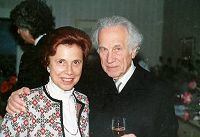 rati
left a huge legacy of recordings of
high quality, many of which today maintain
their appeal. It will be interesting
to observe in the years ahead whether
or not his other, more personal, legacy,
his own compositions, remains in the
repertoire. That, I feel sure, would
have been his preference.
rati
left a huge legacy of recordings of
high quality, many of which today maintain
their appeal. It will be interesting
to observe in the years ahead whether
or not his other, more personal, legacy,
his own compositions, remains in the
repertoire. That, I feel sure, would
have been his preference.
Tony Flynn
Further sources of information:
www
dorati-society.org.uk Antal Dorati
Centenary Society.
http://www.dorati.com
Website set up by Dorati’s widow, the
pianist Ilse von Alpenheim

Antal Dorati and the joy of making music
(Richard Chlupaty) The Antal Dorati
Centenary Society (30 April 2006) ISBN-10:
0955246903 ISBN-13: 978-0955246906 AmazonUK
AmazonUS
Notes of Seven Decades (Antal Dorati)
Hodder & Stoughton Ltd (1 Nov
1979) ISBN-10: 0340159227 ISBN-13: 978-0340159224
 Notes
of Seven Decades (Antal Dorati) Revised
edition - Wayne State University Press
(Jun 1981)
Notes
of Seven Decades (Antal Dorati) Revised
edition - Wayne State University Press
(Jun 1981)
ISBN-10: 0814316859 ISBN-13: 978-0814316856
AmazonUK
AmazonUS
Hungarians in exile (John Hunt)
Short Run Press (1997). Dorati discographyISBN-
0952582791
Antal Dorati:A Catalogue of his
works (Calum MacDonald) (1995?)
Tempo Magazine
http://www.bearacreissues.com/
LP to CD transfers of early Mercury
recordings
http://www.haydnhouse.com/HH9.htm
LP to CD transfers of early Mercury
recordings and the RPO Beethoven cycle
http://www.classicalmusiccd.com/classicalconducting/dorati.html
Recordings of the NSO Washington on
tour -( includes 4 different recordings
of Mahler's Sixth!)
